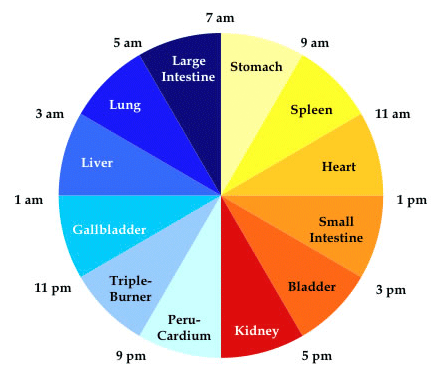In Chinese Medicine Qi follows a cycle throughout the day and night, circulating through the various body organs, explaining why symptoms can wax and wane for certain problems. Every two hours there is an alternating ebb and flow of Qi where one organ system fills and the opposite side of the clock is empty, or at its lowest point.
The time of peak function for the Large Intestine is between 5 and 7 a.m. The bowel empties in preparation for the morning meal. The Stomach and Spleen (digestion) are at their peak between 7 and 11 a.m., which means your mother was right; breakfast is the most important meal of the day. This is the time of optimal digestion and assimilation.
Symptoms of Kidney Deficiency often occur between 5 and 7 a.m. because this is the lowest point of Qi for the kidneys. Kidney Qi peaks between 5 and 7 p.m. Many dogs with acute or chronic kidney disease do not like to eat in the morning but will eat later in the day. This is because their kidney Qi is very weak in the morning and they have no kidney energy to process the breakdown products of food. These animals will be slow to get moving in the morning, preferring to sleep until mid morning. I love to bribe these pets with a bowl of warm oatmeal, which is warming and a great Qi tonic. Conversely, animals with excess or stagnant Kidney Qi will suffer from increased stiffness and pain in the lower back during the peak hours of Bladder and Kidney function, between 3 and 7 p.m.
Pets with heart disease commonly suffer from coughing, fluid in the chest, and congestive heart failure symptoms around 11 p.m. to 1 a.m., when heart Qi is at its lowest. This is why some pets will need an extra dose of diuretics at bedtime to keep them comfortable. These pets will have decreased symptoms and seem to have less trouble around noon, because the heart has maximum Qi at that time.
Pets with liver disease may be agitated, pacing, and vocalize between 1 and 3 a.m. because Liver Qi is at its peak. Liver Qi stagnation is associated with insomnia, frustration, and headaches in people. These same pets will have a lull in energy between 1 and 3 p.m. when Liver Qi is at its lowest point.
By knowing the cycle of Qi, you can predict when your pet may have a little trouble with energy, depending on the medical issues they have. Medications or food can be adjusted to treat the deficiencies or excesses in different body systems. This same cycle applies to people. Think about symptoms you deal with and find the high and low points for that organ. For instance, I have stagnant Liver Qi, which explains my insomnia. I have no problem falling asleep in the evening, but I wake up abruptly around 1 a.m., usually falling back asleep around 4 a.m., when my Liver Qi has calmed down. I also need an afternoon cup of coffee to make it through the 3 to 6 p.m. office hours. What is your body clock telling you?
Disclaimer: This content is for informational purposes only and is not meant to diagnose, treat, or replace consulting a primary veterinarian for individualized care.

